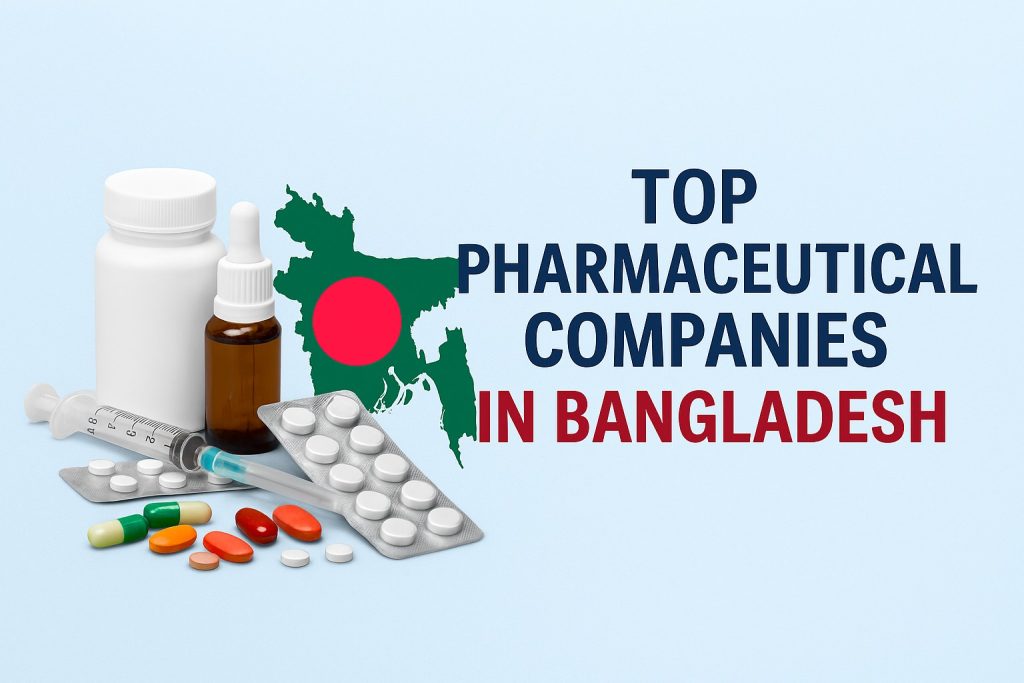Bangladesh’s pharmaceutical industry has evolved into one of the nation’s most powerful economic sectors. Once reliant on imported drugs, it now produces nearly 98% of the country’s pharmaceutical demand and exports to over 150 countries worldwide. This transformation highlights Bangladesh’s success in combining industrial innovation, healthcare expertise, and visionary leadership.

The industry not only provides affordable medicines but also supports national GDP, employment, and international recognition. From generic drug innovation to biotechnology and vaccine production, the top pharmaceutical companies in Bangladesh are redefining the standards of excellence in South Asia’s healthcare landscape.
Overview of the Pharmaceutical Industry in Bangladesh
The pharmaceutical sector is the second-largest contributor to Bangladesh’s economy, trailing only the readymade garments industry. With an estimated market value exceeding USD 4 billion in 2025, it continues to expand at an annual growth rate of 12–15%.
Key Growth Drivers
- Government policies promoting local manufacturing
- TRIPS exemption allowing patent-free production until 2033
- Rising middle-class healthcare demand
- Increased investment in automation and biotechnology
Supported by a skilled workforce and modern facilities, Bangladesh has positioned itself as a cost-efficient hub for high-quality generic drugs, serving both domestic and global markets.
Top Pharmaceutical Companies in Bangladesh (2025 Update)
Bangladesh’s pharmaceutical sector continues to be a cornerstone of industrial growth, innovation, and healthcare accessibility. As of 2025, the industry exports to over 150 countries, contributes roughly 1.8% of GDP, and employs more than 200,000 professionals.
Below are the top pharmaceutical companies in Bangladesh, updated with export performance and strategic developments based on verified 2024–2025 data.
1. Square Pharmaceuticals PLC
Square Pharmaceuticals remains Bangladesh’s leading drug manufacturer, both in market share and international reputation. In fiscal year 2024, Square’s export revenue reached Tk 2.395 billion (≈ USD 21.6 million) — marking a 22% year-on-year growth. With WHO-cGMP, UK MHRA, and TGA Australia-approved facilities, it maintains strict global compliance.
Square’s export network now spans over 40 countries, focusing on Africa, Asia, and the Middle East. Its strength lies in large-scale production of antibiotics, cardiovascular, and herbal medicines. The company is also investing in oncology and biopharmaceuticals to strengthen its regulated-market footprint.
Highlights:
- FY 2024 export revenue: ~USD 21.6 million (+22% YoY)
- Market share: 17% (domestic)
- Key markets: UK, Kenya, Myanmar, Vietnam
2. Incepta Pharmaceuticals Ltd.
Founded in 1999, Incepta has become a symbol of biotechnology excellence in Bangladesh. It is the first local manufacturer of human insulin and vaccines, now exporting to more than 70 countries. Incepta’s export value has surged steadily as vaccine demand increases across Africa and Southeast Asia.
Its strong product base — including anti-diabetic drugs, vaccines, and biosimilars — complements WHO, EU, and MHRA certifications. Incepta’s vaccine division currently produces over 16 human and 13 veterinary vaccines, helping Bangladesh achieve self-reliance in immunization.
Highlights:
- Export destinations: 70+ countries
- Focus areas: Vaccines, biosimilars, biotechnology
- Key certifications: WHO-GMP, EU, UK MHRA
3. Beximco Pharmaceuticals Ltd.
Beximco Pharma is the first Bangladeshi pharmaceutical company to export medicines to the United States, holding full US FDA approval. It contributes roughly 20–22% of Bangladesh’s total pharma exports, making it the country’s most internationally active firm.
In 2024, Beximco reported a 33% increase in export income, driven by new product launches and expanded distribution in the US, EU, and South America. Its portfolio exceeds 500 products covering respiratory, cardiovascular, and antiviral segments. Beximco’s global expansion reflects strong regulatory compliance and technological innovation.
Highlights:
- Export share: 20% of national total
- Export growth: +33% in FY 2024
- Regulated markets: US, EU, Canada
4. Renata Limited
Once Pfizer Bangladesh, Renata Limited now stands as a top-five market player with a diverse product range. Its FY 2024 revenue reached Tk 3,771 crore, while export revenue rose 22.5%, covering 57 countries.
Renata’s dual focus on human pharmaceuticals and animal health gives it unique growth stability. The company is expanding in Latin America and Sub-Saharan Africa through nutraceutical and hormonal formulations. Ethical governance and product quality remain Renata’s competitive advantages.
Highlights:
- Export growth: 22.5% (FY 2024)
- Export destinations: 57 countries
- Product focus: Nutraceuticals, animal health, formulations
5. Opsonin Pharma Ltd.
Founded in 1956, Opsonin Pharma is one of Bangladesh’s oldest and most trusted drug manufacturers. Between May 2024 and April 2025, its exports reached ~USD 3.26 million, primarily to Asia and Africa.
Known for antibiotics, pain relief, and anti-ulcer formulations, Opsonin’s extensive domestic presence gives it a strong platform for overseas expansion. The company’s ongoing investments in sterile manufacturing and dossier development will help it double export earnings in the coming years.
Highlights:
- Export value: USD 3.26 million (2024–25)
- Product categories: Antibiotics, analgesics, anti-ulcers
- Growth driver: Sterile product capacity
6. Eskayef Pharmaceuticals Ltd. (SK+F)
A subsidiary of Transcom Group, Eskayef (SK+F) is recognized for advanced oncology and biopharma production. It became the first Bangladeshi company to export injectable medicines to the USA, a milestone achieved under US FDA oversight.
Eskayef exports to over 60 countries, including UNICEF and UN-sponsored health programs. The company’s specialization in oncology and sterile injectables ensures higher revenue per unit and reinforces Bangladesh’s credibility in global tender markets.
Highlights:
- First to export injectables to US
- Export network: 60+ countries
- Specialties: Oncology, sterile products, biopharma
7. The ACME Laboratories Ltd.
Founded in 1954, ACME combines legacy and innovation. Its FY 2024 revenue was Tk 31.9 billion, with exports forming a modest but expanding share. The company currently serves 25+ countries, focusing on essential generics and herbal medicines.
ACME’s modernization drive, including automation, advanced packaging, and upgraded R&D labs — is expected to raise its export ratio over the next few years. Its wide therapeutic portfolio and efficient cost structure ensure sustainable competitiveness in regional markets.
Highlights:
- FY 2024 revenue: Tk 31.9 billion
- Export markets: 25+ countries
- Product lines: Generics & herbal formulations
8. ACI Pharmaceuticals (Advanced Chemical Industries Ltd.)
Part of the ACI Group, this division has doubled export volume in recent years. ACI Healthcare’s export-dedicated facilities now serve several African and Asian markets. While current export figures are undisclosed, previous reports confirmed 100% growth in FY 2021.
ACI’s diversified portfolio of pharmaceuticals, consumer health, and hygiene products — supports cross-market branding. With new WHO-compliant units and increasing foreign registrations, ACI is steadily becoming a recognized regional exporter.
Highlights:
- Prior export growth: +100% (FY 2021)
- Export sites: Dedicated ACI Healthcare unit
- Focus: Hospital supplies and consumer health
9. Healthcare Pharmaceuticals Ltd. (HPL)
Founded in 1988, HPL is advancing with international accreditations, including TGA, PIC/S, and TFDA. The company recently commissioned a global-standard antibiotics facility aimed at high-volume export production.
HPL’s exports span more than 30 countries in Asia and Africa, with oncology and anti-infective products leading the way. Its quality-first strategy positions it well to enter regulated markets in the near future.
Highlights:
- Export destinations: 30+ countries
- New facility: World-class antibiotics plant
- Certifications: TGA, PIC/S, TFDA
10. Aristopharma Ltd.
Established in 1986, Aristopharma specializes in ophthalmic and injectable products, two of the most export-intensive segments. It now ships to 31 countries across five continents with an estimated USD 15.4 million export value (Dec 2023–Nov 2024).
Its sterile eye-care line enjoys strong global demand, providing higher profit margins. Continuous quality upgrades and registration in new territories keep Aristopharma among Bangladesh’s most promising exporters.
Highlights:
- Export value: USD 15.4 million (2023–24)
- Markets: 31 countries across five continents
- Core products: Ophthalmic & sterile injectables
Export Landscape Summary
| Company | Estimated Export Value (USD) | Destinations | Key Focus Areas |
|---|---|---|---|
| Square Pharma | 21.6 M (FY 2024) | 40+ countries | Generics, herbal & biopharma |
| Incepta Pharma | ~25 M (est.) | 70+ | Vaccines, biosimilars & insulin |
| Beximco Pharma | >40 M (est.) | 120+ | Respiratory & antivirals |
| Renata Ltd. | ~20 M (est.) | 57 | Human & veterinary formulations |
| Opsonin Pharma | 3.26 M | 20+ | Antibiotics, analgesics |
| Eskayef (SK+F) | 15 M (est.) | 60+ | Oncology & injectables |
| ACME Labs | 8 M (est.) | 25+ | Generics & herbal |
| ACI Pharma | 5 M (est.) | 20+ | Nutraceutical & hospital supplies |
| Healthcare Pharma | 6 M (est.) | 30+ | Antibiotics & oncology |
| Aristopharma | 15.4 M (2024) | 31 | Ophthalmic & sterile drug |
Contribution to Bangladesh’s National Economy
The pharmaceutical industry plays a crucial role in shaping Bangladesh’s modern economy.
Key Economic Impacts
- Contributes ~1.8% of GDP
- Employs over 200,000 professionals
- Generates USD 200 million+ in exports annually
This sector reduces dependency on imports, promotes self-reliance, and boosts foreign currency reserves. Its success also demonstrates Bangladesh’s ability to scale complex manufacturing industries effectively.
Pharmaceutical Export Performance
Bangladesh’s pharmaceutical exports have risen consistently over the past decade, driven by cost efficiency and international compliance.
Export Insights
- Reaches 150+ countries including the US, UK, Vietnam, and Kenya
- Major exporters: Beximco, Square, Incepta, Eskayef
- Focus products: antibiotics, insulin, oncology, and anti-viral drugs
The government’s target of achieving USD 1 billion in export earnings by 2030 looks increasingly attainable with sustained innovation and regulatory expansion.
Innovation and Research in the Pharmaceutical Sector
Innovation is the cornerstone of Bangladesh’s pharmaceutical competitiveness.
R&D Focus Areas
- Biotechnology and biosimilars
- Vaccine development and molecular research
- Automation in quality assurance
- Herbal and nutraceutical advancements
Companies like Incepta, Eskayef, and Beximco have heavily invested in biotechnology, paving the way for Bangladesh to become a recognized player in advanced healthcare innovation.
Challenges in the Pharmaceutical Industry
Despite strong growth, several challenges remain for sustainable expansion.
Key Challenges
- Dependence on imported Active Pharmaceutical Ingredients (API)
- Potential TRIPS patent restrictions after 2033
- Skill gaps in advanced pharmaceutical research
- Price pressure in international generic drug markets
To overcome these obstacles, coordinated efforts between government and industry are needed—especially in establishing local API production and enhancing workforce capabilities.
Future Outlook for the Pharmaceutical Industry
The future of Bangladesh’s pharmaceutical industry looks exceptionally bright, with ongoing reforms and technological upgrades.
Growth Opportunities
- Full operation of the API Industrial Park
- Increased investment in biosimilars and vaccines
- Entry into regulated markets (US, EU, Japan)
- Integration of AI and digital supply chains
By 2030, the industry is projected to surpass USD 6 billion, cementing Bangladesh’s status as a regional pharmaceutical powerhouse.
Final Thoughts
The journey of Bangladesh’s pharmaceutical industry is a story of vision, resilience, and innovation. In just a few decades, the country has moved from importing essential drugs to exporting life-saving medicines across continents.
The success of top pharmaceutical companies in Bangladesh reflects a broader national strength of the ability to combine industrial growth with social welfare. As the sector moves toward high-value biotech and global regulatory approval, its contribution to the economy and healthcare accessibility will continue to rise.

